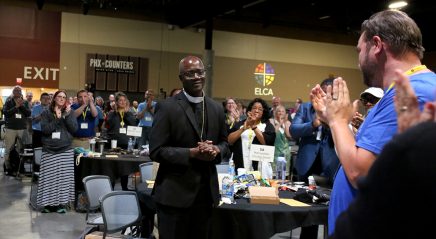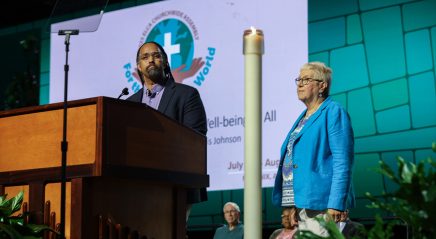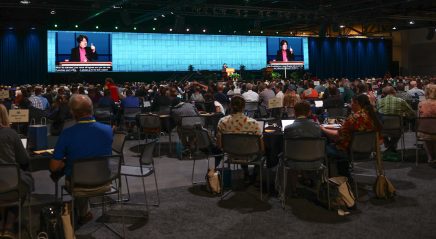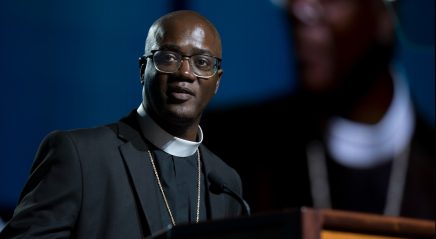On day four of the 2025 ELCA Churchwide Assembly, ELCA Presiding Bishop Elizabeth Eaton offered her report and received recognition for her service, the ELCA’s ecumenical and interreligious partners were recognized, and the assembly considered amendments to the church’s Constitutions, Bylaws, and Continuing Resolutions, among other business.
“I started my ministry as presiding bishop with these four emphases: We are church. We are Lutheran. We are church together. We are church for the sake of the world,” Eaton said in her report. “I will end as I began.”
Eaton’s family and friends then joined her on stage as Imran Siddiqui, ELCA vice president, presented her with the Servus Dei Award given to honor ELCA officers at the completion of their terms.
After Eaton’s report, the assembly considered proposed constitutional amendments recommended by the ELCA Church Council. (The amendments can be found in Section V of the Bulletin of Reports in the Churchwide Assembly Guide.)
The assembly adopted (753-16) the amendments en bloc, except for separately considered amendments recommended by the Commission for a Renewed Lutheran Church. They then approved the following recommendations of the Reference and Counsel Committee pulled from en bloc:
- To refer Motion A to the Legal and Constitutional Review Committee of the Church Council, the proposal to amend 5.01.e. in the ELCA constitution and all model constitution (637-141).
- To refer Motion B to the Legal and Constitutional Review Committee of the Church Council, proposed amendments for both 5.01.e. and 12.41.11 (492-279).
During the lunch hour, representatives of the Sumud initiative—the ELCA’s response to occupation and injustice in Palestine and Israel—and its partners presented on their work and ministry.
Plenary eight opened with the election for secretary, with 29 names remaining on the second ballot. After voting, the assembly agreed (702-54) to complete the second ballot again to avoid confusion due to the closeness of two names on the first ballot, with one of those two removing themselves from consideration on the second ballot.
No candidate received the required 75% of the vote to be elected. The top seven candidates will speak during the morning session on Friday. They are Matthew Riegel, Kevin Anderson, Keith Fry, Daniel Kirschbaum, Josh Tatum, Lucille “CeCee” Mills and Tyler Rasmussen. Biographical information about the candidates can be found in Section X of the Bulletin of Reports in the Churchwide Assembly Guide.
Deep commitments
Eaton then welcomed representatives of the ELCA’s ecumenical and interreligious partners.
Rick Jacobs, president of the Union for Reform Judaism (URJ), noted that last year marked the 30th anniversary of the ELCA’s “Declaration to the Jewish Community,” which acknowledged and rejected Martin Luther’s antisemitic writings. “In that spirit today, we must work together to address the expanding manifestations of group hate against so many, including escalating antisemitism,” Jacobs said.
While Jacobs emphasized the URJ’s partnership with the ELCA and said “the death of every citizen of Gaza is a tragedy, full stop,” he expressed fear that the memorial the assembly passed on day three will make Jewish people feel less safe.
Eaton acknowledged the nature of the ELCA’s history of being a “both-and” church in an “either-or” world. “The things we face in our own country and in our own church and all that’s going on in Israel and Palestine are just not that simple. But we still join in conversation and in action. So thank you,” she said to Jacobs before the two embraced.
Mohamed Elsanousi, executive director of the Network for Religious and Traditional Peacemakers, then spoke about the ELCA’s work with the Islamic Society of North America and the church’s role as founding member of the Shoulder-to-Shoulder Campaign, which offers strategies and support to local and regional efforts to address Islamophobia.
“For more than two decades, the ELCA has cultivated meaningful relationships with the American Muslim community through numerous interfaith projects,” he said. “Those deep commitments to interreligious engagement have fostered mutual trust and confidence and have led the ELCA to playing an instrumental role in the national efforts.” He urged the church to use its leadership to respond to starving children in Gaza.
Eaton introduced Denis Madden, auxiliary bishop of the Archdiocese of Baltimore, by saying that one of the greatest joys in her time as presiding bishop has been developing the relationship between Catholics and Lutherans, noting that 2025 marks the 60th anniversary of the U.S. Lutheran-Catholic dialogue. “We have been blessed to partner together in proclaiming the gospel of our Lord, Jesus Christ, for the life of the world,” Madden affirmed in a video message.
Vashti Murphy McKenzie, president and general secretary of the National Council of Churches of Christ in the USA (NCC) and a retired bishop of the African Methodist Episcopal Church, spoke of gratitude for the ELCA’s role in the council and Eaton’s work in the body. “You are a strong member of the NCC,” she told the assembly. McKenzie also preached during worship at a morning prayer service.
Eaton then introduced Nicolas Kazarian, director of the Department of Inter-Orthodox, Ecumenical and Interfaith Relations of the Greek Orthodox Archdiocese of America, which she called a vital partner in the 1,700th anniversary of the first Ecumenical Council at Nicaea.
“We are encouraged that our churches continue to walk together in theological dialogue and mutual recognition, including the recent conversations between Lutherans and Orthodox on ‘The Common Statement on the Filioque,’ issued exactly a year ago,” Kazarian said.
Representatives of the Lutheran World Federation (LWF) also offered greetings. “Our two churches share a deep commitment to confronting the great challenges of our time,” said Kristine Sandmael, chair of the Church of Norway Committee on Ecumenical and International Relations.
Anne Burghardt, LWF general secretary, offered greetings on behalf of the global community of Lutheran churches. In celebration of the unity and partnership among Lutheran churches, she presented the ELCA with a communion set made by members of the Taizé Community in France, created with soil from LWF refugee camps in Jordan and Kenya. “May it remind you and remind your whole church of the joint communion we have in Jesus Christ,” Burghardt said.
This led to the introduction and consideration of the Filioque, which means “and from the son,” a phrase inserted into the Nicene Creed more than 1,000 years ago, causing the Great Schism of 1054. In 2024 the LWF and the Orthodox churches reached an understanding in its “Common Statement on the Filioque.”
The assembly approved (748-15) a resolution receiving the Common Statement, following the unanimous recommendation of the Ecumenical and Inter-Religious Committee of the Conference of Bishops and the Church Council. The statement did not call for the removal of the Filioque, but created an understanding of the approach both the Lutheran and Orthodox bodies have toward the phrase “and from the Son,” allowing both versions to be recited. After adoption, the assembly recited the Nicene-Constantinople creed, omitting the Filioque for the first time in the ELCA’s history.
More considerations
Yehiel Curry, ELCA presiding bishop-elect and current chair of the Conference of Bishops, presented the group’s report, speaking about the work each of the 65 synod bishops do together throughout the year and detailing each of the committees.
“My goal in sharing all of this with you is to emphasize that the ministry of the Conference of Bishops, collectively and individually, is a ministry for and on behalf of our church,” Curry said. “Our work in this church enables us to draw on the gifts of one another: leaders, resources, networks, and ideas to bring them to life for the sake of the mission and ministry we share in Christ’s church.”
The plenary closed with the assembly returning to consideration of constitutional amendments (Churchwide Assembly Guide). Bylaw 14.32.01 – Motion E in the committee’s report was approved (765-11). The committee recommended adopting the proposal to amend 14.32.01. by striking the words “four-year” and inserting the words “three-year” in its place.
After lengthy debate on an amendment to 22.11.b, Motion C in the committee’s report, and whether new language suggested by a voting member was appropriate and how it would be executed by the Office of the Secretary, the assembly postponed (644-119) discussion until Friday.















